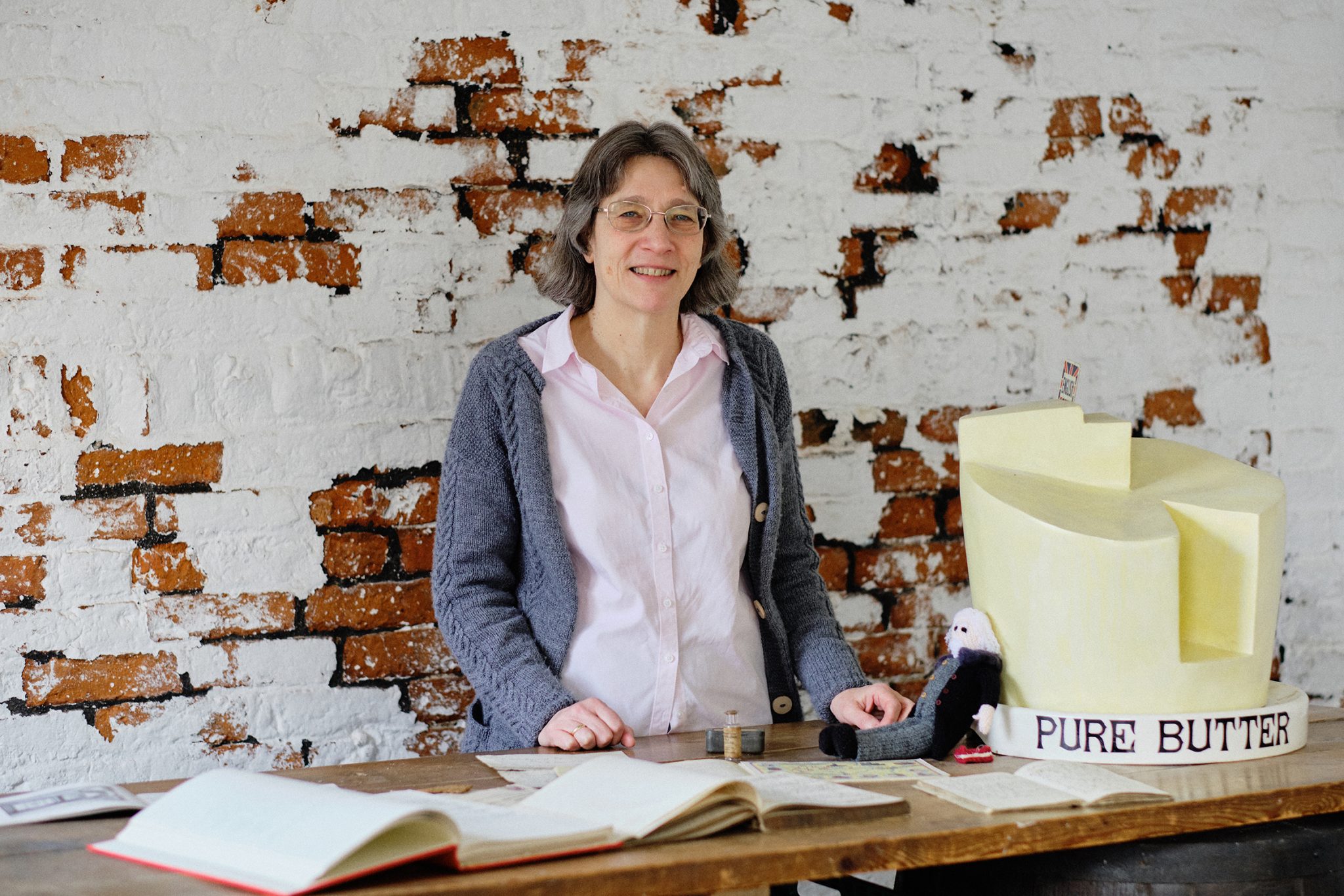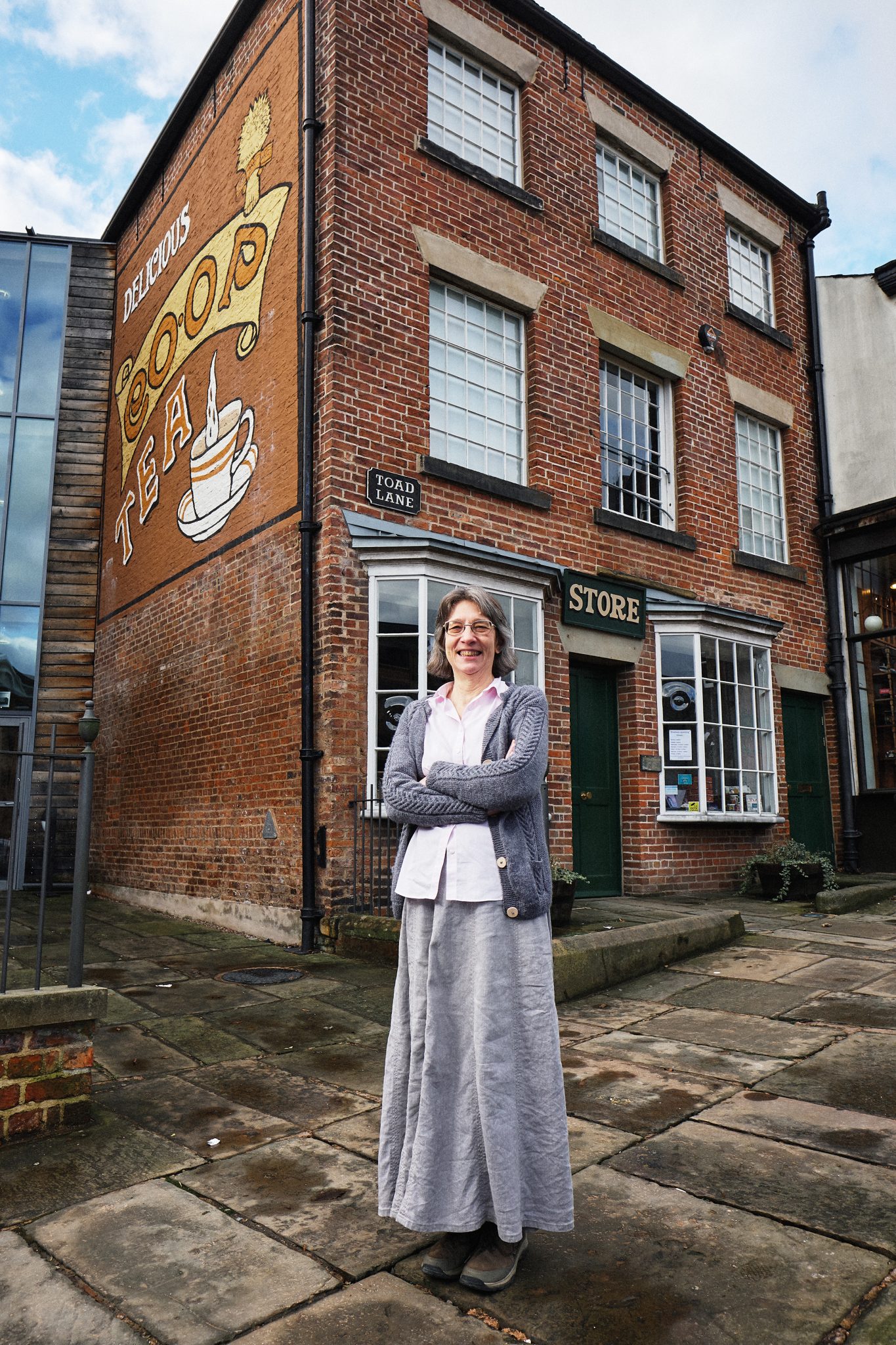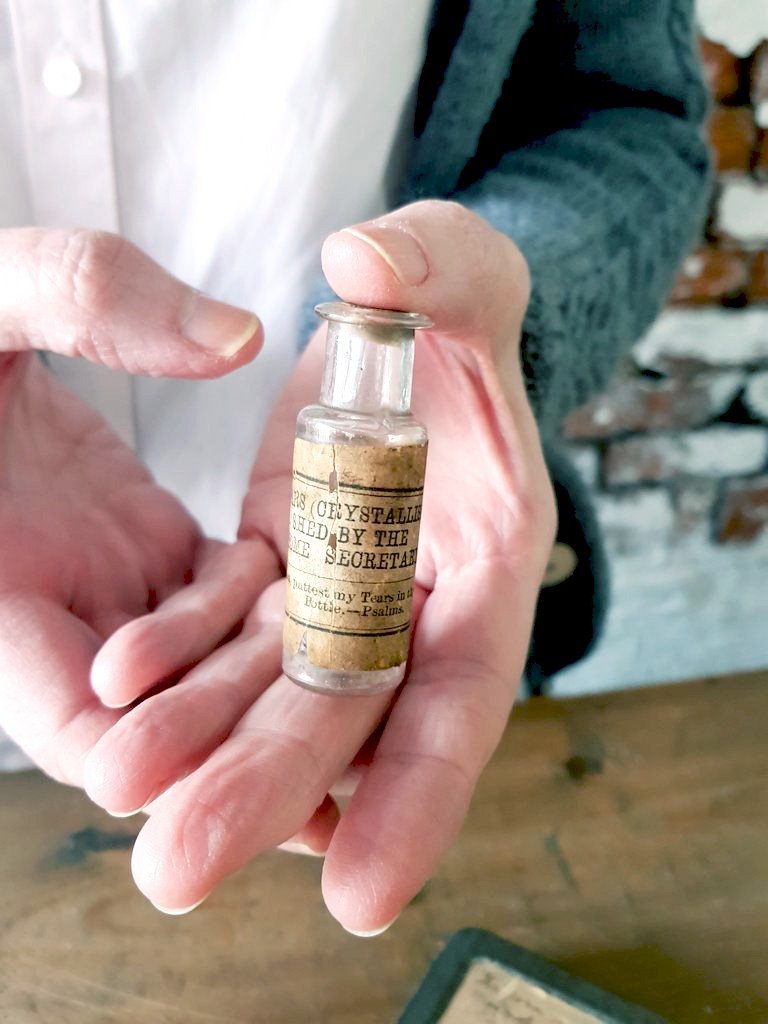Gillian Lonergan has just retired from her role of librarian at the Co-operative Heritage Trust’s National Co-operative Archive – and over the last three decades has been one of the first ports of call for anyone looking to learn more about the history of co-operatives in the UK. She studied librarianship at Manchester Polytechnic, archive administration at Aberystwyth University and indexing and proofreading at work. She is a Wigan Rugby League season ticket holder and spends the rest of her time knitting or attempting to keep the allotment under control. To celebrate her career, we hear about her love of co-ops, the changes she has witnessed and her favourite items from the archive…
How did you first get involved in co-operation?
I became interested in co-ops through working in co-ops. I came to Manchester to go to library school at Manchester Polytechnic – what is now Manchester Metropolitan University. One of my fieldwork placements was at the CWS laboratories library. When I left college, they were looking for somebody for a temporary post. I got it, then when that was coming to an end I heard about a job at the Co-op Union library. So I landed myself working there with no idea about what co-ops were. I had missed them totally. So I started spending some of my lunch hours reading through the books, trying to immerse myself in some of the history – and I got hooked.
The role was based at Holyoake House and I worked alongside Roy Garratt, who had previously worked for the Co-op Press. He was a brilliant man, absolutely wonderful. As a librarian he spent most of his time with international delegations, so I got to know more about the international movement as well. I looked after the library and any information needs, but the main part of the role was to do with the history, encouraging people to learn more about co-operatives.

You say that you got hooked – what was it about co-ops that hooked you?
I think the sheer breadth of it all. The more you look at co-ops, the more you realise that people can achieve anything if they work together. Right the way through the archive, you can see this in story after story. I inherited this love of stories from Roy, I think, because he was very into stories of the movement, the stories that tell how working together really achieves things. It happens today as well of course. Some of the work that the Co-operative College has done in the UK and around the world shows exactly the same thing: a group of people getting together can achieve much more than they can working alone.
Related: Reinvigorating the story of the Rochdale Pioneers
When did you join the Co-operative College?
That was in 2000. The College was then based at Stanford Hall near Loughborough, and over the 50 years it had been there it had developed its own archive. So we had an archive in Manchester, we had an archive at Stanford Hall and it just got silly. We were sending researchers from one to the other, so it was decided that it would be better if we brought them together. I spent 2000 and half of 2001 splitting my time between working from home, working at the museum and working at Stanford Hall. And then the College relocated and returned to the same building it had left in the first place – so I ended up back in Holyoke House.
What are the biggest changes you have witnessed in the co-op movement?
I came to co-ops in the early 1980s, which was not really a high spot for the movement as a whole. At that time you tended to see each type of co-op as very separate, and the Co-op Union was really only dealing with consumer co-operatives. You didn’t get to deal with worker co-ops or housing co-ops, but you knew good things were going on there. It was it was great for me to see the merger of the Co-operative Union and the Industrial Common Ownership Movement (ICOM) in 2001, to form Co-operatives UK, because that brought the consumer and worker co-op movements together so that they could learn from each other. People are much more involved in the movement as a whole, rather than just their a little bit of it. All of the work that went on in the 1990s to do with the restatement of the co-operative identity also had a major impact. You could see people thinking ‘this is why we’re here, this is why what we’re doing is important’.

What about the challenges?
One of the major challenges I have witnessed is that people of my generation didn’t really know about co-ops. They saw the shops on the high street and bought groceries there, but didn’t necessarily know what they were or why they were different. I didn’t learn anything about co-ops at school either, nothing at all. So one of the challenges is making sure that we don’t get to a point again, where somebody can get to their 20s and not know what co-ops are. We need to be much more out there, doing things. We need to be unignorable.
Could you tell us a little about the Co-operative Heritage Trust?
The merger of the two archive collections in 2000 meant that we started to talk about a National Co-operative Archive, that was a really important change in the way we were looking at things. Before that, the archives tended to be nice things to have, but not a huge priority. Setting up something called the National Co-operative Archive gives you a huge challenge and responsibility in that you have to make it work. Creating that gave us the opportunity to then look at how we wanted to develop in the future, and one of the things that became very important was the idea that it needed to be looked after as a heritage entity. That involved setting up a separate charitable trust to own the archive and the museum collections. The Trust always says it has three aims: 1. preservation – making sure that the things are there for future generations. 2. Making them as accessible as possible in whatever way possible. 3. Using them for education.
Setting up a charitable Trust enabled us to do that. The Co-operative Heritage Trust was created in 2007 by the College, Co-operatives UK and the Co-op Group. It has a management agreement with the Co-operative College which manages the archives and does all the background work, enabling the staff to get on with what they need to do. The link with the College also gives us a huge outlet. When people are developing courses at the Co-op College people come to us and say ‘What have you got? How can we build heritage into it?’
Related: The Co-op College’s work from Rochdale to Rwanda
What are your favourite items in the archive?
My favourites are things in the archive that tell a story about what things were like, how things operated, and give a real flavour of an individual or a place. One thing I always loved is from the collection of Edward Owen Greening (1836-1923). He was involved predominantly in agricultural and horticultural co-ops, and as somebody who has an allotment, he’s brilliant! We were listing some of his letters (there are around 11,000 items in the EOG collection) and a volunteer came to me and said ‘I found this stuff.’ ‘Stuff?’ ‘Yes, there’s this brown stuff in one of the letters…’ We dug a bit deeper and it turned out somebody had sent him a sample of moss from Ireland. This was right at the beginning of the 20th century and he had just put it in with his letters – so we have this squashed piece of moss which is rather nice.

Another item is from the George Jacob Holyoake collection. He is one of my great heroes, a great talker about the movement and a great inspirer of others. In his collection we have a little tin containing two bottles, which relate back to when he was involved in the Reform League, campaigning to increase the number of people who could vote in Parliament. A delegation went to Robert Walpole, who was then in the Home Office, to ask if they could hold a big public demonstration. Apparently Walpole was rather worried about this causing public discontent and was said to have wept during the meeting. So the Reform League, as a bit of a joke and a fundraiser, filled these small bottles with bread pellets and carefully labelled them as ‘Walpole’s Tears’.
Items like these bring up a different time. You read about these demonstrations but you don’t necessarily think about the jokes that go alongside and the silly stuff that people did.
Talking of stories, the National Co-operative Archive holds every single back issue of Co-op News since it began in 1871. What’s the best story you have come across?
Co-op News is a fantastic periodical and is the first port of call for most researchers who come in to look at the movement. One story that I love is from about 1904. They had a Christmas greeting from George Jacob Holyoake, with his picture and ‘GOM’ on it. They always called him GOM – the Grand Old Man of co-operation. It’s an interview with him, which is rather beautiful. He was in his 80s then, coming to the end of his life, but he was talking about the bright future that he saw for co-operation and how people could develop it from there on in.
The News covers so many different subjects, because the breadth of it covers all types of co-ops, and anything that it feels is of interest to co-ops. It’s got stories and poetry, all sorts in it. You open a volume from a particular year and it takes you to that time in a really interesting way.
If you could have a conversation with one person from co-operative history, who would it be?
It would have to be Holyoake. He was involved in so many different things and was such an interesting character. Just being able to read some of his letters in the archive gives you quite a flavour of him: sometimes a bit crusty and brusque, but with great knowledge. He was a journalist by profession, so he follows that trend of finding stories. It would also be nice to go back to 1844 and see what went on in the Rochdale Pioneers’ first store on Toad Lane (now the Rochdale Pioneers’ Museum). The Pioneers were so busy doing what they were doing, that they didn’t always write everything down. But for a conversation, it would have to be George.
The College is 100 this year. What do you think its role is in 2019?
I think a lot of what the College was set up to do is also what it’s doing today. It was set up for education in its broadest sense. A lot of the work that it’s doing both in this country and abroad it has been doing throughout its history, so I look forward to it carrying on and extending the depth of what it does in different areas. I think it has a really great future in front of it.
Talking of the future, you’ve been involved with co-ops for over 35 years – what are your plans now?
My plan involves taking early retirement, getting a camper van and a dog and going off exploring. Knowing me, there will be lots of co-ops to visit as well! I’m staying involved with the UK Society for Co-op Studies, working on the Journal, and I’ve said that if anybody has any interesting events that they think I’d like to come to, I’ll be there.